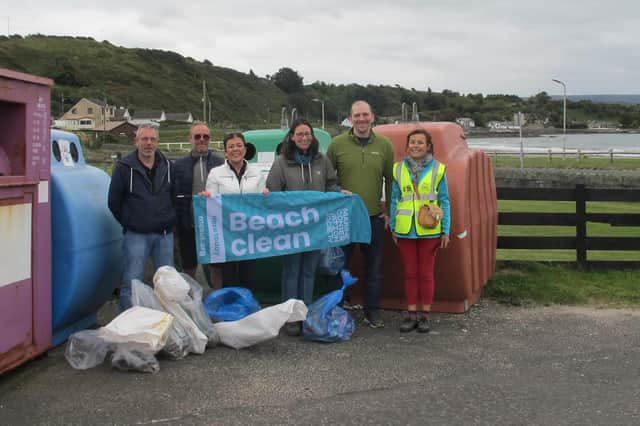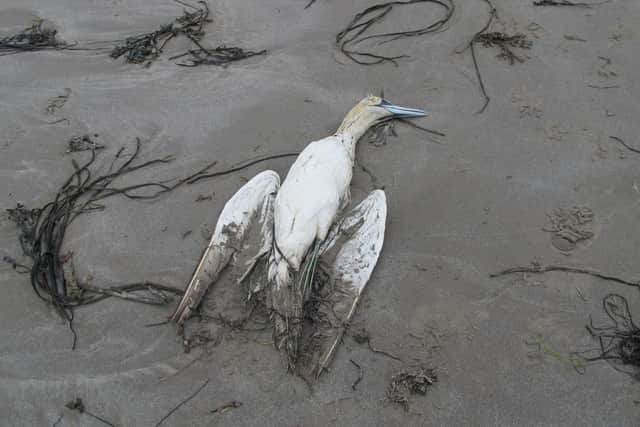Grim find for Islandmagee beach clean team


The dead birds were found by participants in last month’s Marine Conservation Society’s Great British and Northern Irish Beach Clean.
The volunteers, who helped clean over 35kgs of waste from Brown’s Bay beach - as well as from Carrick’s Fisherman’s Quay - have reported the matter to the relevant authorities.
Advertisement
Advertisement
Team leader Elena Aceves-Cully, from Islandmagee, said it was extremely sad to find seven dead seabirds at Brown’s Bay and one at Fisherman’s Quay. Noting this was the first time she has encountered so many stricken creatures, Elena said she suspects the cause was bird flu.


“I reported this to NI Environment Agency and they said that they are likely to be infected with bird flu,” she said. “Volunteers have been warned not to touch any dead animals so it is important that the correct authorities do so [collect them] as soon as they are found to prevent other animals getting infected.”
In July Mid and East Antrim Borough Council issued an appeal to members of the public urging them to report any sightings of dead birds in the Whitehead area. It came after Avian Influenza (AI) was detected in a number of carcasses on the town’s beach.
In response to the latest find, a spokesperson for council said: “The Public Health Agency (PHA) has advised that human infections with Avian Influenza are rare and that the risk to the general public’s health is very low, however it remains the case that the public are being asked not to pick up or touch any dead or injured wild birds as this can cause the disease to spread to other colonies of seabirds or poultry flocks.
Advertisement
Advertisement
“Posters were erected along our coastline in July 2022 advising of the situation, with further advice to the public shared on council’s digital platforms and through the local media advising that council as land owner is responsible for the removal and disposal of all dead birds from our beaches and marinas, therefore incidents should be reported to [email protected] . The volunteer group followed this advice and the seven gulls were removed as a matter of urgency by council at that time.”
The council also pointed to the DAERA website for more information and advice: www.daera-ni.gov.uk/articles/wild-birds-and-advice-public
In an online update last month, the department advised HPAI had been detected in wild sea birds at a number of locations in Northern Ireland, adding: “If you find a dead wild bird please report to the DAERA helpline. If you find a sick or dying wild bird, these can be reported to the landowner or the USPCA.”
Main Sources
Meanwhile, the beach clean team recorded a total of 456 items of rubbish along the full stretch of both beaches. The data, which has been collected by this group for the last 16 years (and for the first time at Fisherman’s Quay), will help MCS identify the main sources of litter on and keep the issue of the dangers of marine litter to the ecosystem and humans high on the local and government agenda.
Advertisement
Advertisement
The beach litter survey continued to find plastic as the biggest source of waste (82% of all items in Browns Bay and 76% in Fisherman’s) with the top item types found being plastic items (364) such as very small, small and larger plastic bits, plastic bottles, lids/caps, crisp/sweet/lolly wrappers, foamed polystyrene fragments, string/cord/rope and cigarette butts (35 in total, 30 at Fisherman’s).
Elena said it was encouraging not to encounter any cotton buds. A total of 42 glass pieces were also found, 31 at Fisherman’s Quay.
"This shows us that the most common source of this rubbish is the public (33-35%) whilst the rest is washing over from the sea after being discarded either off shore or at other coastline locations.
“It was also very disappointing to find horse pooh and also 18 bags of bagged dog pooh, showing a considerable increase on previous years. Owners should show more consideration and take those to the nearest bin as they can be a hazard both for beach users and coastal wildlife.
Advertisement
Advertisement
“All participants noted how dangerous plastic, rope, fishing line and cigarette butts can be to marine wildlife, capable of choking them or being swallowed and eventually ending up in our food chain.”
More details on both surveys can be found at https://www.mcsuk.org/litter-surveys/3640b900-2457-4493-90c6-9d91530ea7c5/ and https://www.mcsuk.org/litter-surveys/7c1f801f-0d82-4fd6-a9c6-ec368decd567/
Supported Initiative
Elena went on to express her gratitude to all those who have supported the initiative.
“I would like to thank the Marine Conservation Society and Mid and East Antrim Borough Council’s Recycling department, for providing us with cleaning equipment and materials, organising the picking up the rubbish after the event and supporting the picking effort on the day.
Advertisement
Advertisement
"I would also like to thank the Stable Stop’s coffee bar at Brown’s Bay for a great coffee and traybakes, which was very welcome after the hard work.”
The Great British and Northern Irish Beach and River Clean took place in September 2022 on beaches and rivers all over the UK. Data recorded at each survey has been sent to the MCS to identify the quantities and sources of marine and coastal litter. MCS will use these results at a national level to campaign against these sources of litter and this can be found at www.mcsuk.org.
MCS provides information and guidance on many aspects of marine conservation and produces the annual Good Beach Guide (www.goodbeachguide.co.uk), the Good Fish Guide (www.goodfishguide.co.uk) and www.fishonline.org on sustainable seafood, as well as promoting public participation in volunteer projects such as MCS Beachwatch Big Weekend and Basking Shark Watch.
